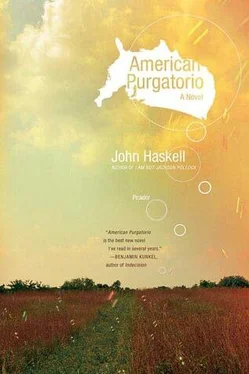John Haskell - American Purgatorio
Здесь есть возможность читать онлайн «John Haskell - American Purgatorio» весь текст электронной книги совершенно бесплатно (целиком полную версию без сокращений). В некоторых случаях можно слушать аудио, скачать через торрент в формате fb2 и присутствует краткое содержание. Год выпуска: 2006, Издательство: Picador, Жанр: Современная проза, на английском языке. Описание произведения, (предисловие) а так же отзывы посетителей доступны на портале библиотеки ЛибКат.
- Название:American Purgatorio
- Автор:
- Издательство:Picador
- Жанр:
- Год:2006
- ISBN:нет данных
- Рейтинг книги:3 / 5. Голосов: 1
-
Избранное:Добавить в избранное
- Отзывы:
-
Ваша оценка:
- 60
- 1
- 2
- 3
- 4
- 5
American Purgatorio: краткое содержание, описание и аннотация
Предлагаем к чтению аннотацию, описание, краткое содержание или предисловие (зависит от того, что написал сам автор книги «American Purgatorio»). Если вы не нашли необходимую информацию о книге — напишите в комментариях, мы постараемся отыскать её.
Los Angeles Times
American Purgatorio — читать онлайн бесплатно полную книгу (весь текст) целиком
Ниже представлен текст книги, разбитый по страницам. Система сохранения места последней прочитанной страницы, позволяет с удобством читать онлайн бесплатно книгу «American Purgatorio», без необходимости каждый раз заново искать на чём Вы остановились. Поставьте закладку, и сможете в любой момент перейти на страницу, на которой закончили чтение.
Интервал:
Закладка:
So when she puts the car into gear I’m waiting, still intending to say something about the glass on the ground, still intending to be good, but before I get an opportunity, she shifts the car back into park. She turns off the engine. “You know,” she says, “I think I will take you up on your offer.”
She gets out. And I’m a little nervous now, walking to my car, opening my passenger door, and excusing my mess. She settles into the plastic seat and I get in behind the wheel and then I start the car.
“Thank you,” she says. “It’s pretty far away.”
“I don’t mind,” I say. And as we drive off I can tell that she’s looking at me, and that by looking at me she’s giving me a signal to reciprocate.
But I don’t.
She offers to pay me, but I say, “You just tell me where to go.”
We drive along, past stoplights, moving with the flow of traffic until the town is behind us. The road begins to wind up into low hills. She’s still looking at me, and I’m staring straight ahead, past the dashboard to the terrain outside.
“Have you ever gone off the road?” she says.
“You mean in an off-road vehicle or do you mean like…?”
“What’s your name?”
“Out of control?”
“What do people call you?” she says.
“Friends, you mean?”
“You must have a name.”
“ Several names. That different people call me.”
“Does that mean you don’t want to tell me your name?”
“What’s your name?” I say.
“I already told you. I hate my name.”
“Jack,” I tell her.
“Like Kerouac.”
“Linda,” I say.
“Right. And your name is Jack.”
I can feel her looking at the side of my face.
Although I’m not aware of any barrier or wall between us, there is something. And what it is, in a sense, is Anne, or my belief in Anne and my life with Anne, and because the person next to me is not Anne, I’m creating or constructing this particular wall or barrier or screen.
“Are you married, Jack?” she says.
“You mean because I don’t wear a ring?” I say, lifting my left hand.
“I’ve never been married either. Officially,” she says.
I look straight ahead and see the arc of the wiper traced on the window, and the window itself. “Are the people you’re with … I’ve noticed you’re traveling with some people.”
“You really like looking at the road,” she says.
“I’m driving.”
“But we’re also talking.”
“True,” I say.
And she points to where I need to turn. “We’re getting close,” she says.
“What would I look at?” I say. “I mean I’ve noticed your friends, the people you’re with…”
“Look at me, for instance.”
And looking straight ahead I tell her, “I’m concentrating on the road.”
“That’s all right,” she says. “Except maybe you’ve concentrated enough. It’s not really all that complicated, is it?”
And I can feel a million things going on in my mind, and to avoid the confusion of all of them happening at once, I turn and look at her face.
“There,” she says, pointing to a barn up ahead, off to the side. “You see that barn thing? That’s the barn.”
I slow down, turn right, and drive up a gravel driveway. I park on some level ground near a propane tank. I kill the engine. “We made it,” I say.
She unties her scarf and shakes out her hair.
And it might not be clear from our words alone, but what was just happening was that I wasn’t doing what she wanted me to do. I wasn’t looking at her. I was seeming to be doing it, or seeming to be trying to do it, but I wasn’t.
She wants a little attention and there’s nothing wrong with that. She wants to break through the barrier between us, thinking that breaking through will make her happy. And maybe it would. But my happiness is different. My happiness — I wouldn’t even use the word “happiness,” my form of satisfaction — comes from keeping her from what she wants. She seems to have enough happiness as it is, and because I don’t have enough or don’t feel I have enough, I want to keep it from her. If I can’t have it, no one will.
4
There’s a red house nestled in the hill, and across the road there’s a tumbledown chicken coop. An older man appears at the door of the house with a bright red stocking cap on his head, smiling and waving. He walks to her side of the car, and immediately they embrace. I watch the hug until, after a while, she introduces me, referring to me as a friend, and the old man walks over to me, looks into my eyes, takes my hand, and embraces me.
Together we walk to the house, the man leading the way. He and Linda are talking about work and people, and there’s something strange, or at least I’m sensing something strange, and it isn’t clear what it is until the man looks up, turns to me, and asks me who I am.
“I’m Linda’s friend,” I say.
“Linda?” he says. Then holding up his open palms he says, “Welcome.”
His smile seems full of equanimity and acceptance, although it’s possible it only seems that way. It’s possible that only certain things, certain events or facts or people, get through the filter of his attention. Linda mentioned to me that her friend was losing touch, by which she meant he was losing his memory, and although he seems clear-headed, as we walk to the house I’m looking at the old guy, trying to discern any evidence of dementia or incoherence.
In the house there’s a large, unlit fireplace, neat and orderly, and there’s a desk by the window, neat and orderly and unused. The whole house is that way. The rugs are clean. At first we’re all standing around, Linda and the old man exchanging different kinds of information, and at a slight pause Linda turns to me and says, “Would you like something?”
“You mean to drink?” I say.
“There’s tea,” the old man says.
“I could use a little liquid,” I say, and it turns out the man has made some sun tea by leaving a glass jar of water and a tea bag sitting out on the back steps. “We have some in the refrigerator,” he says, walking through an archway dividing the front part of the house from the kitchen, negotiating his way around the various pieces of furniture.
I join Linda on the large sofa, crossing my legs. She adjusts the material of her pants. I’m sitting on a crack between two cushions and she’s sitting on a third cushion, and both the padding and the springs of the sofa are getting older, and the whole thing is not absolutely firm and so the sagging of the sofa draws the two of us closer.
There we are, sitting on the lumpy sofa, listening to the clinking of glass in the next room, and even for me, involved as I am with the past, the present moment is taking my attention. The old man calls out, “I’m putting in a little bit of sugar,” and he returns with two glasses of tea with ice cubes. He’s standing there, looking at the two of us, holding the tray, looking and standing, and she says to him, “Where would you like to sit?”
“I’m going to find your bathroom,” I say, standing up as he sits down.
Mr. V. — that’s what she’s calling the man — explains the way but I assure him I can find it. And I do.
I’m in the bathroom and Linda is in the fireplace room, and although we are separated by several walls, I imagine we’re thinking about the same thing: each other. I’m wondering who she is, and if somehow she’s responsible for the kidnapping of Anne, or the disappearance of Anne. And what about her friends? And bringing me up to this house in the forest? And this old man? What’s that about? And I’m sure she’s wondering who I am, this person who seems to be following her. And is he following her, or is she bringing him along? And if she’s bringing him along, why? He seems like an honest person, the way he stands with his weight on one leg, his arm bent, but it doesn’t mean he actually is.
Читать дальшеИнтервал:
Закладка:
Похожие книги на «American Purgatorio»
Представляем Вашему вниманию похожие книги на «American Purgatorio» списком для выбора. Мы отобрали схожую по названию и смыслу литературу в надежде предоставить читателям больше вариантов отыскать новые, интересные, ещё непрочитанные произведения.
Обсуждение, отзывы о книге «American Purgatorio» и просто собственные мнения читателей. Оставьте ваши комментарии, напишите, что Вы думаете о произведении, его смысле или главных героях. Укажите что конкретно понравилось, а что нет, и почему Вы так считаете.











